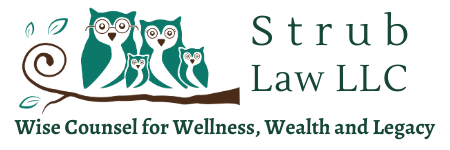 The cost of not updating your plan can be very high – likely much more than your plan cost you in the first place. If you’re like most people, you probably view estate planning as a onerous necessity—just one more thing to check off life’s endless “to-do” list.
The cost of not updating your plan can be very high – likely much more than your plan cost you in the first place. If you’re like most people, you probably view estate planning as a onerous necessity—just one more thing to check off life’s endless “to-do” list.
You may shop around and find a lawyer to create planning documents for you, or you might try creating your own DIY plan using online documents. Then, you’ll put those documents into a drawer, mentally check estate planning off your to-do list, and forget about them.
The problem is, your estate plan is not a one-and-done type of deal.
In fact, if it’s not regularly updated when your assets, family situation, and/or the laws change, your plan may be basically worthless when your family needs it. What’s more, failing to regularly update your plan can create its own unique set of problems that can leave your family worse off than if you’d never created a plan at all.
The following true story illustrates the consequences of not updating your plan, and it happened to the founder and CEO of New Law Business Model, Alexis Neely. Indeed, this experience was one of the leading catalysts for her to create the new, family-centered model of estate planning we use with all our clients.
The father-in-law story
When Alexis was in law school, her father-in-law died. He’d done his estate planning—or at least thought he had. He paid a Florida law firm roughly $3000 to prepare an estate plan for him, so his family wouldn’t be stuck dealing with the hassles and expense of probate court or drawn into needless conflict with his ex-wife.
And yet, after his death, that’s exactly what did happen. His family was forced to go to court in order to claim assets that were supposed to pass directly to them. And on top of that, they had to deal with his ex-wife and her attorneys in the process.
Alexis couldn’t understand it. If her father-in-law paid $3,000 for an estate plan, why were his loved ones dealing with the court and his ex-wife? It turned out that he had not updated his planning documents and his assets were not properly titled.
Alexis’ father-in-law had created a trust so that when he died, his assets would pass directly to his family and they wouldn’t have to endure probate. However, some of his assets had never been transferred into the name of his trust. And since there was no updated inventory of his assets, there was no way for his family to confirm everything he had when he died. To this day, one of his accounts is still stuck in the Florida Department of Unclaimed Property.
When starting her her own law firm, Alexis did so with the intention and commitment that she would ensure her clients’ plans would work when their families needed it and create a service model built around that.
Keep your plan up to date
We recommend you review your plan annually to make sure it’s up to date, and immediately amend your plan following events like divorce, deaths, births, and inheritances. We have built-in systems and processes to remind our clients to review and update their plans to keep their plans in sync with their life changes, any changes in the law changes, and changes in their assets.
Moreover, we also recommend you create (and regularly update) an inventory of all your assets. As part of our planning packages, we help you create a comprehensive asset inventory and we support you in making sure it stays up to date throughout your lifetime.
To help you inventory your digital assets, including digital assets like cryptocurrency, photos, videos, and social media accounts we are partnering with DCS (read more about them on our site and their site). DCS is the leading provider of digital assets management and we are proud to offer the latest services for protecting your digital estate.
This way, your family will know what you have and how to find it when something happens to you. Nothing you’ve worked so hard for will be lost to our state’s Department of Unclaimed Property.
Properly title your trust assets
When you create a trust, it’s not enough to list the assets you want it to cover. You must transfer the legal title of certain assets—real estate, bank accounts, securities, brokerage accounts—to the trust for them to be disbursed properly. This is known as “funding” the trust.
We’ll support you in getting your assets “funded” into your trust when you initially create it. We’ll also help you with funding new assets you acquire over the course of your life to your trust (or otherwise properly titling them with the correct beneficiary designations). In addition, we’ll help you with keeping an accurate inventory. This will keep your assets from being lost, as well as keeping court involvement in your estate to a minimum.
Keep your family out of court and out of conflict
Our planning services go far beyond simply creating documents and then never seeing you again. We foster ongoing relationships with our clients. We’ll support you in not only creating a comprehensive plan, but also ensuring you regularly update your plan to make certain that it works and is there for your family when you cannot be. Contact us today or click to schedule your initial appointment, a Family Wealth Planning Session.
